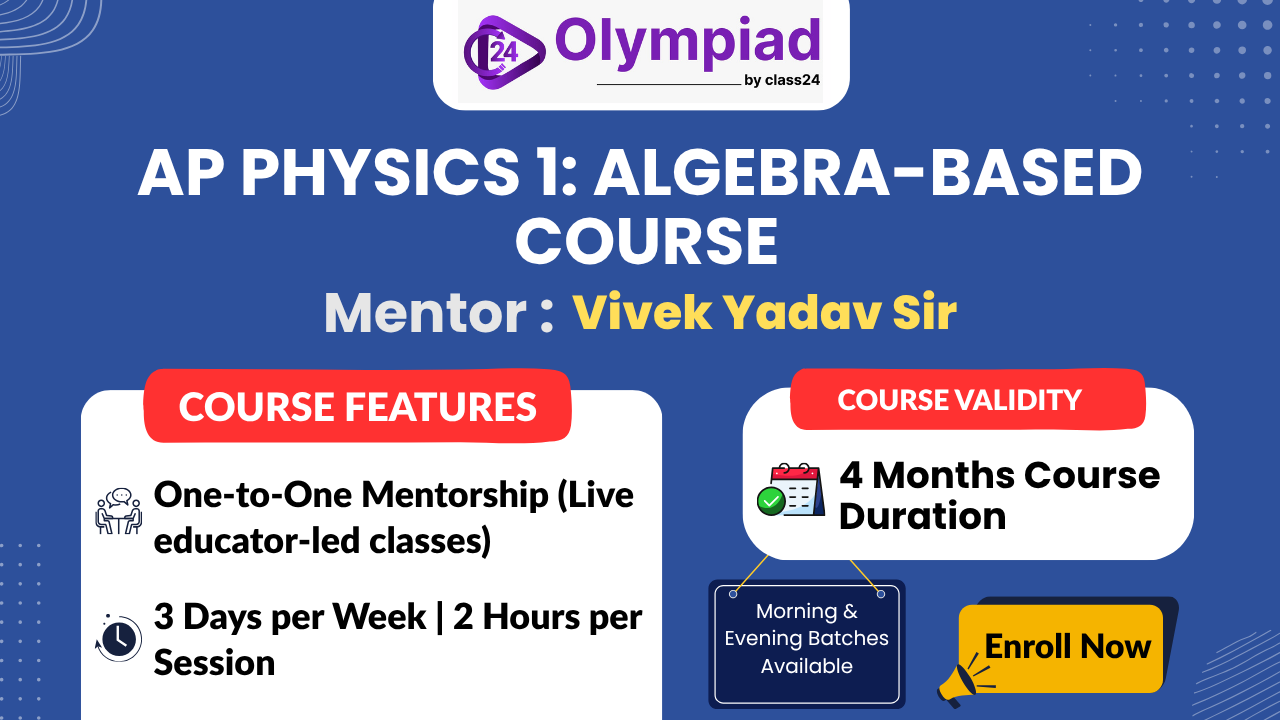AP Physics 1: Algebra-Based 2025 – Master Motion, Forces & Energy with Hands-On Labs
AP Physics 1: Algebra-Based is a foundational course designed for high school students who want to explore the core principles of physics without requiring calculus. The course covers essential topics like kinematics, dynamics, energy, momentum, rotational motion, oscillations, and fluids, while focusing on real-world applications through labs and problem-solving exercises. With a structured syllabus, hands-on experiments, and exam-specific preparation, AP Physics 1 helps students build strong analytical skills, earn potential college credits, and prepare for advanced STEM programs.
About the Course
AP Physics 1 is an algebra-based course that delves into fundamental physics principles such as kinematics, dynamics, and energy. It encourages students to investigate and answer questions through hands-on laboratory work, exploring phenomena like why objects float or sink, why bicycles are easier to balance when moving fast, or the perception of backward motion when a car overtakes on a highway.
Course Units:
The curriculum for AP Physics 1 is structured into several units, each focusing on specific areas of physics:
- Unit 1: Kinematics - Introduces students to the study of motion.
- Unit 2: Force and Translational Dynamics - Revisits concepts from Unit 1 to explore force as the interaction between objects.
- Unit 3: Work, Energy, and Power – Covers the definitions and relationships between work, energy, and power.
- Unit 4: Linear Momentum – Explores the relationship between force, time, and momentum, and teaches the application of the law of conservation of momentum in physical situations.
- Unit 5: Torque and Rotational Dynamics – Utilises tools, techniques, and models from previous units to analyse rotating bodies and the causes of their rotations.
- Unit 6: Energy and Momentum of Rotating Systems –Explores the energy and momentum of objects rotating around an axis, connecting these concepts to their linear equivalents.
- Unit 7: Oscillations – Applies the learned tools, techniques, and models to analyse simple harmonic motion.
- Unit 8: Fluids –Investigates the behaviour and motion of materials that can change shape and analyses how this behaviour interacts with other objects
Professional Online Tutoring in Science & Math
Unlock your child’s true potential with expert-led, interactive online classes that make complex concepts simple, spark curiosity, and build lasting confidence in STEM subjects.
- Customized learning plans for every grade
- Live, engaging sessions with experienced educators
- Globally aligned curriculum for future-ready skills
Book a 1-on-1 Counseling Session

Benefits of AP Physics
- Well-developed STEM basis: Develop college-level physics and engineering programs.
- Practical experience: The practical knowledge can be applied through laboratory experiments and practical problem-solving.
- Analytical thinking: Build on reasoning and modeling and calculating skills that you need to perform in advanced studies.
- College preparation: Prep AP Physics 1 test and receive possible college credits.
- Useful knowledge: This is the knowledge of the everyday world and the physics of everyday experiences.
Why Choose Us
We provide a student-centered structure of the course in AP Physics 1:
Qualified teachers
Study under seasoned teachers who have effective teaching methods of AP Physics.
Interactive learning
Interactive learning implies the use of labs, simulations, and problem solving exercises to learn deeply.
Individual attention:
Get instructions on how to do things, and what to do, at your pace.
Exam-specific study
Learn how to study in order to cover concepts, practice questions, and tips when examining, so that you can score as much as possible.
What We Offer?
The course uses AP Physics 1 with us, and you receive:
- Lesson plans and detailed course material for each of the units.
- Practical laboratories and experiments to support learning.
- Problem solving instructions and exercises.
- AP exam simulation and Mock tests in order to gain confidence.
- Doubt-clearing meetings and individual mentoring.
- Through progress tracking in order to get to know all the topics.
AP Physics 1: Algebra-Based (Test-1)
Download the complete AP Physics 1: Algebra-Based (Test-1) PDF that includes both questions and detailed solutions. Practice core topics like kinematics, dynamics, work, energy, power, and waves with this authentic Class 24 resource for AP-level preparation.



